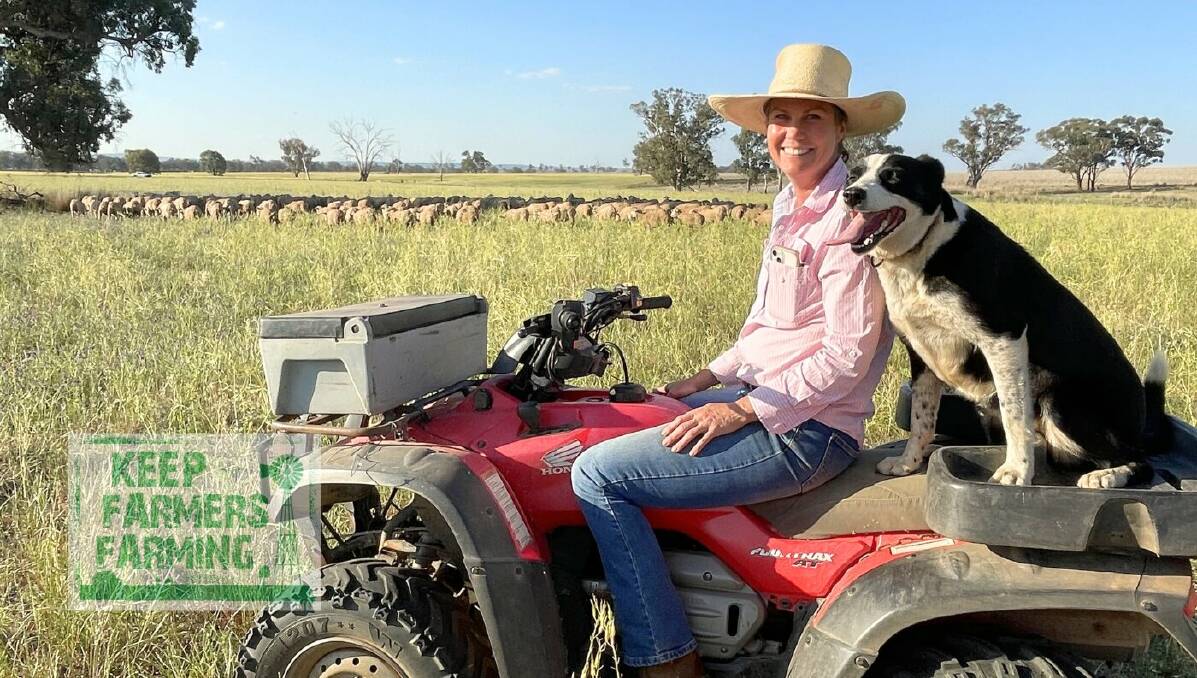
Dunedoo mixed farmer Alison Kensit is not usually one to get embroiled in politics, but says the federal government's policies are being shaped by what might win votes instead of creating long-term, beneficial outcomes.
Subscribe now for unlimited access to all our agricultural news
across the nation
$0/
(min cost $0)
or signup to continue reading
She said this was a persistent issue with Labor governments, as was a lack of understanding of rural issues.
"We don't have the numbers being regional - I feel like we don't have a voice," she said.
Ms Kensit runs the 486-hectare Redbank Park, including its 900-head core flock of Langdene-blood Merino ewes used to breed first-cross lambs, as well as cropping and opportunisitic stock trades.
The ewes are bought in, Ms Kensit having developed long-term relationships with her suppliers, and joined to New Armatree Border Leicester rams, from Armatree.
"There are so many challenges in the industry at the moment. People have lost a lot of confidence, so I think it's great for the NFF to step in and offer some support and it would be really good for the government to give them an ear," Ms Kensit said of the organisation's campaign, called Keep Farmers Farming, launched today.
Ms Kensit has four kids, around high school age and into their early twenties, and works remotely for succession planning specialist Isobel Knight's business, Proagtive Farm Succession.
Around her off-farm work, Ms Kensit was also already working her way through the tight season.
"Because I'm predominantly lucerne and summer active pastures I actually had everything in confinement over winter to give the paddocks a break," she said.
"But I didn't want to confinement feed for too long and I'm hopeful that there will be a break maybe in the next three or four months."
She had already begun her destocking plan.
"I sold my first-cross ewe lambs earlier than I usually would this year and I'll probably sell my old Merino ewes earlier than I normally would have as well," she said.
She uses grain grown on farm for the confinement feeding, but this year grazed her cereal crops, meaning less grain in reserve.
The confinement lot, which she built independently, brought some resilience to her operation. And like many sheep producers right now, wool's role in creating cash flow had also come to the fore.
"The lamb market is down I'd say 60pc, or more in places, whereas the wool market has just been fairly constant," she said.
"It seems to be an easy option in my operation - the wool's almost a by-product, but you're always going to get paid for it."
She had also kicked off with the introduction of electronic identification, something she said was inevitable.
"I actually tagged all my ewes with eIDs this year in preparation, just as a marketing strategy," she said.
"I think changes like that you need to embrace, because it's going to happen. Obviously it's happened in Victoria. It's going to happen in NSW, so have a good attitude and embrace it."
She was curious as to how she could also use the technology to her advantage, such as tracking lambing rates, lamb survival and wool quality.
"I keep my ewes from maidens until six years, so it would be interesting to have that data," she said.
While having accepted the eID roll-out, she felt there was more the government could do to help markets.
"I think with the proposed live sheep ban, that's just creating more uncertainty for producers," she said.
"The markets at the moment are probably the biggest concern. The lamb markets are back probably 60pc, or more in places. The mutton market, it's through the floor.
"I think there are two sides. There is obviously the animal welfare issues and you can't deny that, but also there's trading on the world market. It's an export industry, so it's isolating Australia if they ban it.
"It's like a domino effect. Even if it's not affecting me directly, it's just the uncertainty."
As for the proposed 10pc biosecurity levy, she said margins were tight.
"On the current markets, margins are at a minimum already. It's hard to even fathom really," she said, of the implications of a further 10pc squeeze.
"It's disappointing that they're putting that on farmers when farmers are actually trying their best and there are other avenues such as travellers or importers that are a higher biosecurity risk.
"It would definitely change some of my management practices in order to try and minimise its impacts, which would not necessarily be the right thing for the country."
She said this could be counterproductive for soil health as she would likely run more sheep and do less cropping, with ramifications for her pasture program and associated weed control.
She said the government was making these decisions in isolation, without understanding the consequences.
"They just seem to not take advice from, or be aware of the needs of regional Australia, or the ag industry," she said.
"Even with the live export ban ... it's getting the attention without probably a lot of balanced feedback from the ag sector.
"I think farmers are really needing a voice at the moment. Everyone's lost a lot of confidence, markets are at an all time low and it just really feels like these proposed policies are kicking us while we're down."
- ACM Agri, the publisher of this masthead, is proud to be the media partner for this campaign.
I think farmers are really needing a voice at the moment. Everyone's lost a lot of confidence, markets are at an all time low and it just really feels like these proposed policies are kicking us while we're down.
- Alison Kensit, Dunedoo mixed farmer.


